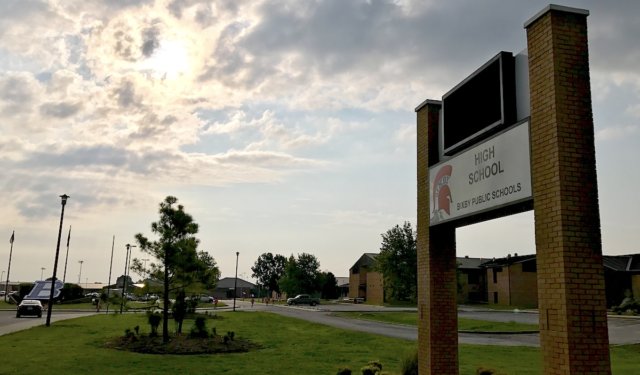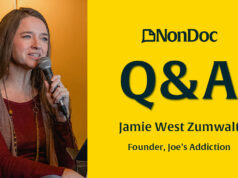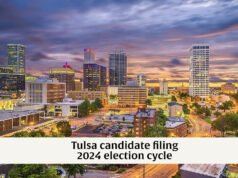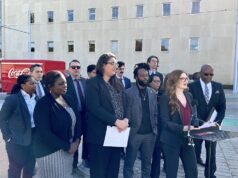

In an effort to discourage substance abuse, Bixby High School administrators have told students they must take — and pay for — a drug test to obtain campus-parking privileges this year. The school’s new policy also makes permit holders subject to additional tests on a “random selection basis.”
Additionally, the policy states: “At any time a student parker may be requested by the Principal or designee based on reasonable suspicion, to be tested for alcohol or illegal drugs.”
The policy builds on the school’s existing drug testing, which previously had been limited to students who participate in athletics and other competitive activities, according to Bixby High School principal Terry Adams.
“Ultimately, the goal is to prevent alcohol and drug use among our students,” Adams said. “This is another way to help provide a positive intervention.”
But at least one school parent and the American Civil Liberties Union of Oklahoma are expressing their skepticism about the new policy.
“To require every student who wants to park to get a drug test and also make them pay the $25 for it just seems like an over-reach onto our public school students,” said Kurt Gwartney, whose daughter will be a senior at Bixby High School when classes start Aug. 23.
Gwartney said he has multiple concerns.
“At a time when every dollar for public education in Oklahoma is precious, I don’t know that we need to be spending any staff or administration time on administering a test that, as far as I know, has not really been shown to do much in terms of limiting drug use among students,” Gwartney said. “Second, I prefer also that we are innocent until proven guilty.”
ACLU of Oklahoma legal director Brady Henderson said his organization has been made aware of the Bixby High School policy, which was announced in a letter to parents Tuesday. Henderson said it’s too early to know whether the policy might warrant a legal challenge, but he said the ACLU is reviewing details.
“This is a policy that pushes the envelope a little,” Henderson said. “It is very easy to figure out that this is bad policy.”
While some studies of mandatory student drug testing have shown a minor decrease in student drug use, the national ACLU’s webpage on the topic argues that alcohol and most drugs are not easily detected through drug testing. It also argues that drug testing potentially encourages students to use stronger drugs that are more difficult to detect than marijuana.
“This is the first time we’ve seen this exact policy (in Oklahoma) that forces all students who drive to school to participate in this drug-test process and to do it at their own cost,” Henderson said.
Adams said he believes Bixby is the first high school in Oklahoma to implement a drug-test requirement for parking permits, and he said he is always willing to speak with students or parents who have concerns.
“I’ve heard from some parents who have told me (that) some are in support and some a few have concerns,” said Adams, who has three children himself, two of whom are students at his high school. “We’ve been a district that has tested competitive athletics and activities for some time now. So this is just a natural extension of what we’ve done for some time as far as trying to prevent illegal drug use and alcohol use among our kids.”
‘They have such access to prescription drugs’
That’s the way Tristy Fryer views the situation as well. Fryer’s daughter will be a sophomore at Bixby High School this year.
“To me, it’s a protection. I feel like our schools are held liable for everything,” Fryer said. “I feel bad for schools in a way because they’re blamed for everything.”
Fryer said her daughter had just taken a drug test Wednesday morning to participate in cheer leading. That test will be sufficient for her to purchase a $20 parking permit as well.
“It’s amazing to me how young kids are trying things. They have such access to prescription drugs,” said Fryer, who used to teach in the district. “I feel like when we’re testing our kids, we’re being a little more responsible and aware. But it’s not perfect, and it doesn’t mean kids aren’t going to drink or smoke pot.”
Gwartney said his daughter is planning to take a drug test because she wants a parking permit, but he said she called him after hearing about the policy because they have discussed civil liberties and constitutional protections. He said that while his daughter did not want to comment for this article, she was comfortable with him speaking out.
“She knows that her dad is a strong supporter of civil liberties,” Gwartney said. “She also understands there is a need to stand up and ask tough questions to government officials that include our public school administrators when they implement these types of rules.”
‘I think there might be some constitutional issues there’
Gwartney, who has previously authored two NonDoc commentaries, said he also has concerns about whether the testing policy will single out a certain group of students.
“That was almost a greater concern than the actual testing. Basically what they’ve done is they’ve created a class of students that will require additional scrutiny over the general population. I think there might be some constitutional issues there,” he said. “I also hope the school produces a regular report that lists the type of students who are pulled for random tests.”
Adams said the school’s drug testing is administered by DATL, a Tulsa company that orchestrates the random follow-up testing. He said that means school officials are not singling out individual students for random tests, and he said the school works with a treatment center in Tulsa called Palmer that does evaluations and counseling recommendations for students who test positive.
He said students will receive a 30-day suspension of parking or activity privileges for a first offense, though that can be reduced to 15 or 10 days if they agree to educational initiatives or counseling.
Adams said he also has discretion to assist lower-income students who may need to set up a payment plan for the test. The fee can also be reduced or waived depending upon individual circumstances. The initial $25 cost also covers the school’s random testing throughout the year.
“I think that any opportunity you have to give children a reason not to ever participate in alcohol or illegal drug use is a positive,” Adams said. “If a kid’s out on a weekend and they are maybe a casual user and they are offered that and they say, ‘Look, I can’t do that because I need to be able to park at school or I’m involved in an activity,’ I think that gives kids a good reason not to ever participate in that type of behavior.”
Gwartney said he views the school’s drug testing efforts a little differently.
“I think there are better ways to do that,” he said. “Instead of requiring drug tests for extracurricular activities that could be a barrier to some students, I think extracurricular activities could be a protective factor. Let’s not put up a barrier for them to be involved.”
But Adams said drugs and alcohol are a societal problem that people should attempt to address.
“There’s been a wave of people who want to encourage that type of behavior — rather than discourage it — through legalized marijuana and those kinds of petitions,” Adams said. “So, no, I don’t think Bixby has any bigger problem than any other community, but it’s certainly a problem in our state.
“We’re trying to be on the leading edge of trying to intervene with our own students.”
Bixby High School’s 2017-2018 parking permit policy
